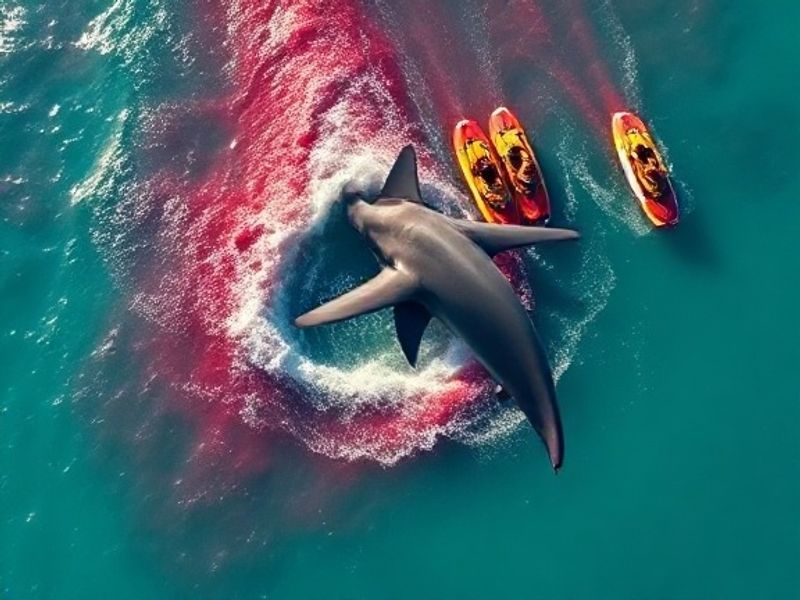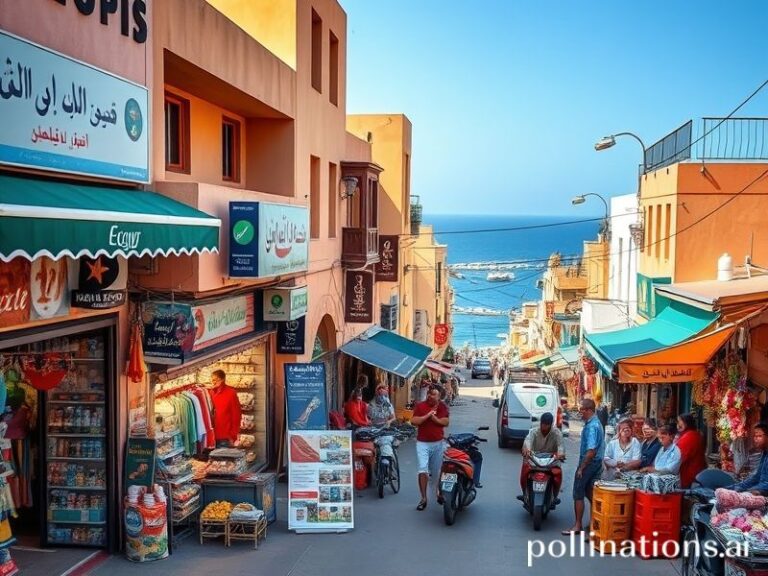Sydney Shark Attack: When Global Panic Meets Local Predator in the World’s Most Photogenic Harbour
Sydney Harbour, that postcard-perfect collision of opera-house curves and Bondi bronzed optimism, spent Tuesday morning playing host to an older, toothier kind of performer. A 51-year-old British expat—let’s call him Nigel for the sake of narrative convenience—took an unscheduled swim with what authorities clinically label “a large shark” and what locals with fewer syllables call “Bruce.” One leg down, one helicopter ride later, Nigel is stable in hospital, and Sydney’s tourism brochures have gained an involuntary footnote.
Cue the global chorus: CNN cut to a breathless correspondent in a flak jacket, as if the shark might resurface waving an ISIS flag. Sky News ran a chyron reading “TERROR IN THE SURF,” because nothing spikes ad revenue like implying Jaws moonlights for Al-Qaeda. Meanwhile, in Cape Town, marine biologists rolled their eyes so hard they probably registered on the Richter scale. They’ve spent years explaining that sharks aren’t jihadists with gills, but try telling that to a species that invented both clickbait and sunscreen.
From an international vantage point, the incident is less about one man’s misfortune and more about humanity’s enduring talent for turning statistical outliers into existential panic. Shark attacks worldwide average about 70 a year, which is roughly the number of selfies that kill people in half the time. Yet we don’t dispatch navy frigates to Instagram. Instead, we deploy drones, shark nets, and—this week’s innovation—AI-powered “clever buoys” that text lifeguards when something bigger than a breadboard cruises by. Because nothing says “relaxing beach day” like push notifications from a paranoid robot.
Over in the Mediterranean, Greek islands are quietly thrilled that the Red Sea has resumed its starring role as shark-attack central. Their taverna owners, still recovering from the pandemic’s collective hallucination, would prefer headlines about ouzo and sunsets, thank you very much. In Réunion Island—where shark-human relations make Sydney look like a petting zoo—officials watched the coverage with the weary solidarity of war veterans. They’ve tried everything from drum lines to underwater electric fields, only to discover that the sharks, like all good French intellectuals, simply ignore them.
Economically, Sydney’s bite-sized drama is a masterclass in unintended stimulus. Every camera crew guzzles flat whites at Bondi cafés; every helicopter pilot racks up overtime. Insurance underwriters, those unsung poets of catastrophe, quietly reprice “marine predator encounters” while day-trading their own mortality spreadsheets. And somewhere in Silicon Valley, a start-up just secured seed funding for “SharkCoin,” a blockchain designed to decentralize fear itself. White paper forthcoming; liability explicitly disclaimed.
The broader significance? It’s the same lesson we repress every summer: the ocean isn’t a theme park, and nature still accepts cash, flesh, or both. Climate change is nudging sharks into new neighborhoods—cooler waters, richer pickings, better Wi-Fi—while humans respond with the strategic acumen of toddlers sticking forks into sockets. Australia, having already cycled through prime ministers the way other countries cycle through phones, now gets to debate whether “culling” is conservation or just revenge with a bigger boat. Spoiler: the sharks aren’t on LinkedIn, so negotiations remain tricky.
And yet, tomorrow’s sunrise will still paint the Harbour Bridge gold, and surfers will still paddle out, because resignation is a poor substitute for saltwater therapy. Nigel, bandaged and trending on TikTok, will probably receive a complimentary wetsuit and lifetime supply of Vegemite—proof that even trauma can be merchandised if you time the press release right. The shark, anonymous and unpaid, will go back to doing what apex predators do: reminding mammals with mortgages that the food chain still has a bouncer.
In the end, the incident is less a tragedy than a ritual, one performed on beaches from Malibu to Mozambique. We enter the sea; the sea occasionally objects. We feign surprise, file insurance claims, and update our apps. The planet shrugs, indifferent as ever. And somewhere offshore, Bruce practices his next cameo, secure in the knowledge that ratings season is eternal.







